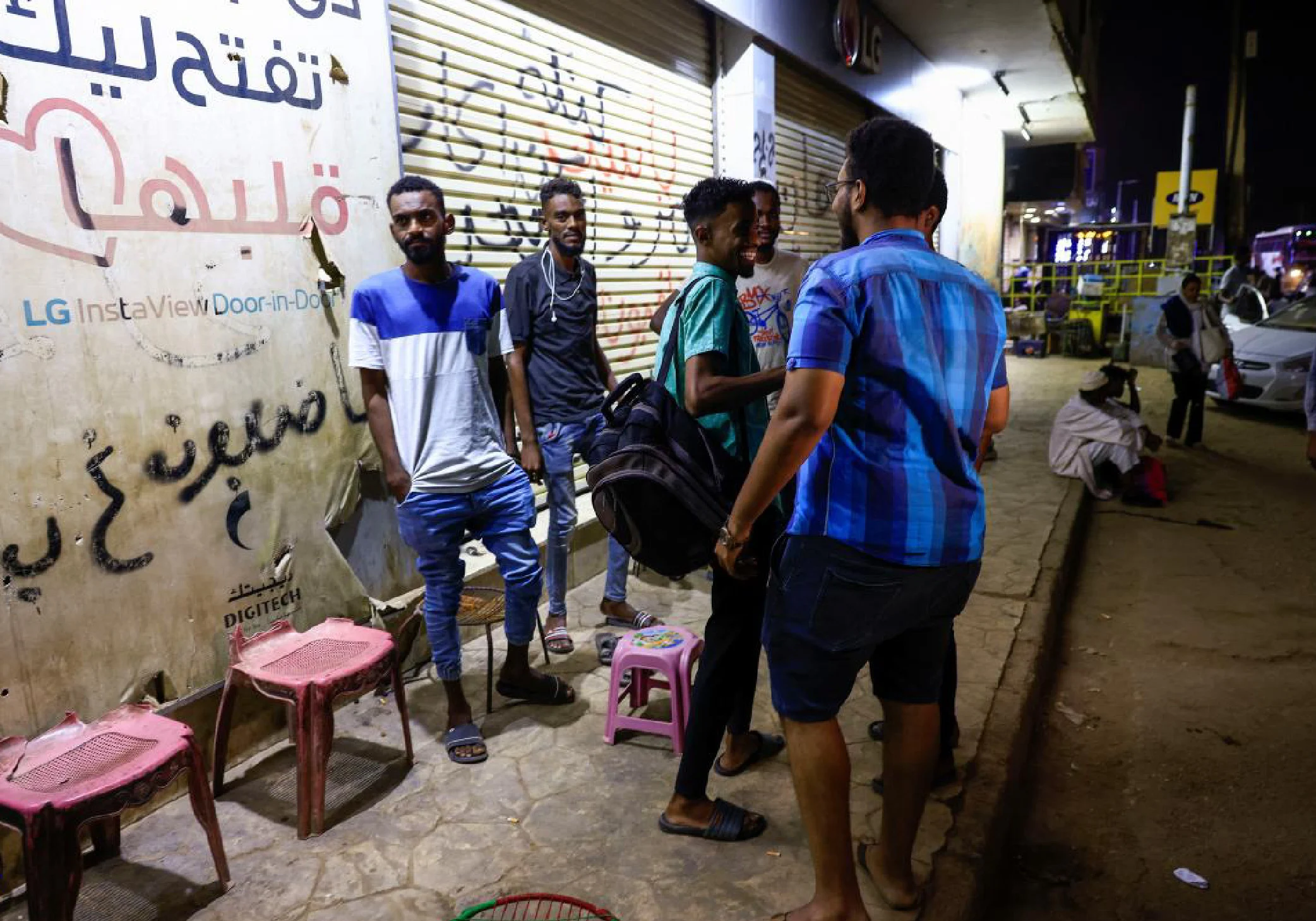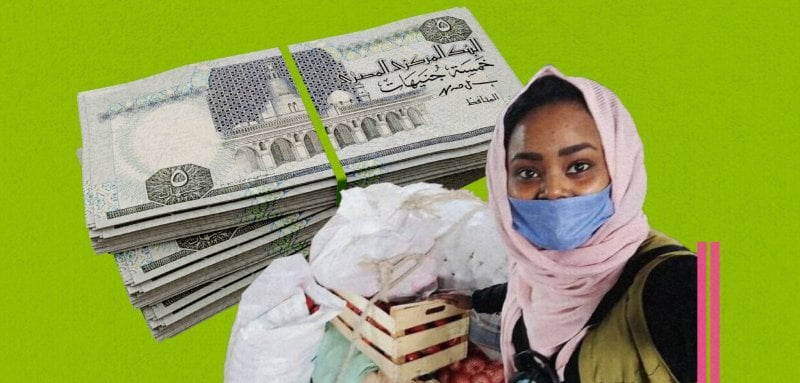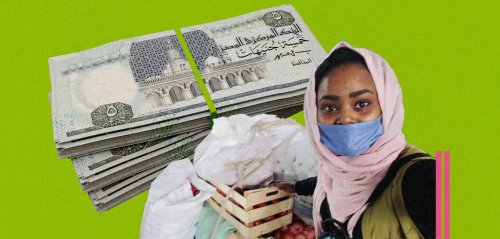After they had lived in Cairo for three years, Hanadi el-Tayeb's family left the Egyptian capital in early February and went back to Khartoum, due to the wave of high prices that hit the Egyptian markets, as their monthly income did not meet their needs there.
Hanadi, 34, an English teacher at a private school, says that a year and a half ago, she asked her family of four to settle in Cairo in order to treat her mother with breast cancer, given the scarcity of treatment doses in Sudan and the low treatment service, and also so that one of her sisters can study at university. She would regularly send them 5,000 Egyptian pounds per month (about $333 before the beginning of the year, and which is now equivalent to about $161), and it was enough for their needs, including treatment.
She tells Raseef22 that after the Egyptian pound fell in value against other currencies, which led to an increase in the prices of goods and services, the amount she used to send home became insufficient, especially since she did not have any additional income through which she could save more money.
"My family used to rent an apartment for half of the amount and use the other half to meet their needs, but it was no longer enough after the rise in consumer prices there, so I had to cut off my mother's treatment and my sister's education," she says.
During her family’s stay in Cairo, Hanadi lived in a dormitory with university students from Khartoum, and has now moved in with her parents, for whom she rented a house for 175,000 Sudanese pounds, or about $300.
Hanadi admits that her salary is not enough to meet the needs of her family in Sudan, especially after they sold the necessities of their rented house in Khartoum before emigrating to Cairo, which prompted her to look for some to buy them again in monthly installments, but she says with a sigh, "It is better for us to starve in our own country."
What is the fate of the four million Sudanese living in Egypt, in addition to 50,000 refugees?
Why did the Sudanese prefer Egypt?
While Hanadi made the difficult decision to go back, Ibrahim Fadlallah, who has been living with his family in Cairo for two years, remains hesitant, despite having realized that his income does not allow him to settle there.
In June 2020, Fadlallah sold his house in the capital Khartoum, and bought an apartment in Cairo, where he settled with his wife and children, to work in the field of bringing household utensils and electrical appliances from Egypt and selling them in Sudan, achieving a net income equivalent to around $600 per month.
But the wave of high prices that have hit the Egyptian markets made Fadlallah, who shares what he earns from his trade with his parents, think of returning and settling in Khartoum. This means he would have to leave his son, who is still studying, in Cairo, and make him move to a shared housing or dormitory with other young men and rent their residence to finance his education expenses.
Fadlallah is one of four million Sudanese living in Egypt, according to a report issued on August 7, 2022, by the International Organization for Migration (IOM), in addition to another 50,000 refugees.
Hanadi admits that her salary is not enough to meet the needs of her family in Sudan, and they are yet to secure their most basic needs after moving back home, but she says with a sigh, "It is better for us to starve in our own country.."
A large part of this number left Sudan, according to Fadlallah, who spoke to Raseef22, due to the devaluation of the local currency, high food prices, unemployment, poor health and education services, in addition to the power cuts for several hours a day and lack of security, as a result of the economic crisis that the country has been experiencing since 2011, which has worsened in recent years in an unbearable way, leaving a third of the population in need of humanitarian assistance in 2023.
The continuous closure of the education and university education sector, due to the Covid pandemic and the ongoing protests since the end of 2018, in addition to political instability, has also prompted many Sudanese to prefer to study in stable and well-educated Egyptian universities compared to Sudanese curricula.

The Four Freedoms Agreement
The Four Freedoms agreement concluded between Khartoum and Cairo (namely the freedom to own, move, reside and work) allows citizens of both states to enjoy “freedom of residence, freedom of movement, freedom to undertake economic activity and freedom to acquire and dispose property”. It has made Egypt attractive to more Sudanese people seeking quality education and treatment, fleeing power and war, and aspiring to use it as a gateway for migration to Europe, in addition to the advantage of its geographical proximity, government facilities, and the lower prices of food, services, and real estate compared to Khartoum.
Fadlallah says that some Sudanese families who reside permanently in Egypt depend on their savings earned from the surplus of selling their homes and properties in Sudan and buying others in Cairo, while others live on the money sent to them by their expatriate children in other countries, while the rest work in marginal professions that do not generate much income for them.
"The main obstacle is that Egypt does not have job opportunities, yet there are Sudanese men working in trade between Cairo and Khartoum, and Sudanese women working in the manufacture and sale of local products such as perfumes, but many expatriates live on their savings or remittances that they receive from their families," he adds.
Are the conditions for return fulfilled?
It seems the reasons that made Egypt a preferred choice for millions of Sudanese people, especially with regard to the economy, are gradually disappearing, as the Egyptian pound has lost nearly 50% of its purchasing value in less than a year, accompanied by high rate of inflation and increased public debt, which made Cairo subject to the conditions of the International Monetary Fund (IMF).
These conditions are represented in expanding the social safety net, removing the military's control over the economy, selling state assets, and managing the currency via a managed flexible exchange rate methodology, which would make the central bank lose part of its control in intervening to prevent the collapse of the Egyptian pound.
It is true that Cairo now has a hard currency reserve that enables it to finance import expenses for a period of time, but if not accompanied by the implementation of reforms, this reserve could decrease, which means a further collapse of currency value and higher inflation, and thus an increase in the prices of goods and services.
A strong economy is what attracts expatriates to countries, and once it falls apart, those who had come to settle there, flee to other countries in search of the things they had come for, and Egypt will be no exception.
Has Sudan become better for its people compared to Cairo after its economic conditions recently deteriorated?
Increased burdens
In light of these difficult economic conditions, the Egyptian media began to demand the imposition of taxes on expatriates in their homeland, and perhaps this may have been prompted by the authority or one of its wings.
The authority in Egypt has yet to announce a plan to impose taxes on expatriates, but if the economy continues to deteriorate, it may become unavoidable.
In light of these concerns, Fadlallah stresses that many Sudanese based in Egypt are considering returning to their country, but Siham Omar is not one of them.
Siham lives in Cairo's Faisal district – an area favored by the Sudanese who are starting to form their own communities there – with her daughter, who is studying at a private medical college, and her son, who is looking for work.
She tells Raseef22, "She relies on the money that her expatriate husband in Saudi Arabia sends, so she doesn't want to go back to Sudan until after her daughter finishes her studies, and she might even stay there for good.”
To escape the miserable living conditions, many Sudanese fled to the neighboring country in the north, hoping for a better life and easier conditions, but fortune does not favor all, as Cairo, which used to be a semi-safe haven, is now also in jeopardy after it was left in the wind. So will they return to their previous suffering in their homelands, or are the difficulties and hardships abroad still less burdensome for them?
Raseef22 is a not for profit entity. Our focus is on quality journalism. Every contribution to the NasRaseef membership goes directly towards journalism production. We stand independent, not accepting corporate sponsorships, sponsored content or political funding.
Support our mission to keep Raseef22 available to all readers by clicking here!
Interested in writing with us? Check our pitch process here!





Join the Conversation
Ghina Hashem -
8 hours agoالحب حرام بس اعلامهم يلي ماجابت للبلد الا الدمار معليش يرفعوها نحنى محاربون في الشرق الاوسط كافة
ذوالفقار عباس -
1 day agoا
Hossam Sami -
1 day agoصعود "أحزاب اليمين" نتيجة طبيعية جداً لرفض البعض; وعددهم ليس بالقليل أبداً. لفكرة الإندماج بل...
Anonymous user -
3 days agoرائع و عظيم ..
جيسيكا ملو فالنتاين -
1 week agoزاوية الموضوع لطيفة وتستحق التفكير إلا أنك حجبت عن المرأة أدوارا مهمة تلعبها في العائلة والمجتمع...
Bosaina Sharba -
1 week agoحلو الAudio
شكرا لالكن